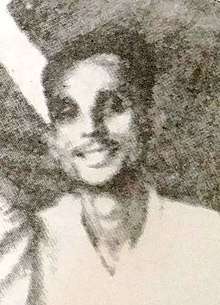Somnath Lahiri
Somnath Lahiri (1901–1984)[1] was an Indian statesman, writer and a leader of Communist Party of India. He was a member of Constituent Assembly of India from Bengal and later served as a Member of West Bengal Legislative assembly.
Somnath Lahiri | |
|---|---|
সোমনাথ লাহিড়ী | |
 | |
| Member of West Bengal Legislative Assembly | |
| In office 1967–1977 | |
| Constituency | Dhakuria |
| Member of West Bengal Legislative Assembly | |
| In office 1957–1967 | |
| Constituency | Alipore |
| Member of Constituent Assembly of India | |
| In office 9 December 1946 – 24 January 1950 | |
| Minister of Information and Public Relations, West Bengal | |
| In office 1967-1968 | |
| Minister of Local Self Government, Development and Planning, West Bengal | |
| In office 1969-1970 | |
| Personal details | |
| Born | September 1, 1909 |
| Died | October 19, 1984 (aged 75) |
| Citizenship | Indian |
| Political party | Communist Party of India |
| Occupation | Political Activist and Writer |
Early life
Lahiri became attracted to Marxism under the guidance of Bengali revolutionary Bhupendranath Datta in 1930. Initially, he worked in E.B. Railway workers' union and played an important role with Dr. Ronen Sen and Abdul Halim in building the Communist party's Calcutta Committee.[2][3]
Politics
Lahiri joined the Communist party in 1931, and started working in Rail and Trum workers Union in Kolkata. In 1933, he organized the first labour association of Tata Iron & Steel in Jamshedpur. According to the party's resolution of 1938, he became attached with Muzaffar Ahmed (politician) and Bankim Mukherjee and joined the Left consolidation committee. He also lead the historical Sweeper strike of Kolkata Municipal Corporation in 1944. Lahiri was the sole Communist member in the Constituent Assembly in 1946. He also substantially contributed to the debates regarding drafting of the Constitution of India.[2][3]
Works
Somnath Lahiri was a well known political intellectual and writer. In 1931 he translated the book The State and Revolution to Bengali. Samyobad (Socialism) is another book of his. He was the editor of Swadhinata, a daily left political magazine. He also wrote many articles in Ganashakti, Aage Cholo, Kalanatar. Kalijuger golpo. The short stories collection of Somnath Lahiri was first published in 1967.[4]
References
- Social Science Textbook for Class XI - Part III. p. 57. ISBN 9788189611194.
- Subodh C. Sengupta & Anjali Basu, Part I (2002). Sansad Bangali Charitavidhan (Bengali). Kolkata: Sahitya Sansad. p. 605. ISBN 81-85626-65-0.
- "Remembering Somnath Lahiri on His Birth Centenary". mainstreamweekly.net. 5 October 2009. Retrieved 2 September 2017.
- Somnath Lahiri (1967). Kalijuger Golpo (Bengali). Kolkata: Manisha Publication.